




|
Fellows’ Flyer |
|
December/January 2011 |
|
News and views for and by Princeton in Africa Fellows |
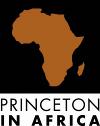


|
As far as dramatic event openings go, the International Rescue Committee’s (IRC) launch of the 16 Days of Activism to End Violence Against Women campaign in Hagadera Refugee Camp could have come straight out of a film. After waking up at an unmentionable hour to set up for the day’s events, my colleagues and I returned to IRC’s compound to complete our last logistical task: gathering various community leaders, women’s groups, coworkers, etc., to march through the camp until reaching the community center, where the official launch events would take place. While hastily handing out white ribbons, trying to locate functioning loudspeakers and attaching banners to the trucks that were part of our road show, we remained oblivious to the dark clouds gathering overhead. To be fair, Hagadera is hot, dusty and located in Dadaab 100 kilometers from the Somali border so rain is rarely on the mind.
Moments later the sky opened up and chaos ensued – the trucks took off with people crammed into the beds, leaving the rest of us to either chase after them, hop into one of our ever-present white Land Cruisers or begin the march in the rain.
For me the 16 Days launch event is much like my experience in the humanitarian field so far – sometimes, regardless of the incredible planning effort and consideration of all possibilities the unpredicted happens, threatening to dismantle the entire undertaking. What I find remarkable is how quickly and at the same time thoughtfully my colleagues adjust to manage the new situation, and how I am learning to do the same.
Flexibility is at the core of my work with the IRC: regardless of my location, be it working from the office in Nairobi or out in one of the IRC-Kenya’s program sites we deal with dynamic situations – one of the camps could experience a sudden refugee influx, unexpected rains could lead to a cholera outbreak in the Turkana region or a change in priorities from a donor could result in a lack of funding. Sometimes there is a clear and logical way forward; other times the solution requires this magical combination of confidence and experience.
Despite a less-than expected start to the day the launch went on: when the downpour reduced to a drizzle we all regrouped and continued our procession through the camp blocks and market. Our group grew as we marched, everyone more soaked than ever anticipated and the schedule of events delayed but the atmosphere was full of excitement. Hundreds of community members turned out to participate in and in support of the IRC’s efforts, making it a huge success. If further proof is needed, the launch concluded with everyone singing and dancing in the community center, no longer worried about wet hair or ruined banners. |
|
by Victoria Shepard, 10-’11 Fellow at International Rescue Committee, Kenya |
|
Notes from the Field |
|
Victoria meeting with a mother-to-mother support group to discuss nutritional challenges to infant and young child feeding in Hagadera |

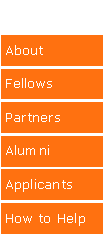

|
Notes from the Field |
|
The entrance to the 2iE International Institute of Water and Environmental Engineering - many nationalities are represented among the faculty, researchers and students of 2iE |
|
Katie Camille spent time in Zambia over the winter holidays exploring Victoria Falls with other current PiAf Fellows |
|
Members of a women's peace committee in Kainuk, Turkana - Northwest Kenya, with which IRC works |
|
by Katie Camille Friedman, ‘10-’11 Fellow at 2iE in Burkina Faso |

|
Despite graduating from college and moving halfway across the world, I am still living like a college student. I live in a dorm room and share a hall bathroom. My neighbors often play loud music. I am part of a bubble of academia, surrounded by people my age who are busy with classes and schoolwork as well as researchers leading interesting projects. However, things are a little different this time around. Everyone speaks French, and the vast majority of students are from West and Central Africa. Besides the English language professor, I appear to be the only native English speaker on campus, which means I am a popular proofreader for scientific papers. The percentage of male students at this engineering school is very high, making the gender-neutral bathroom a less than desirable situation. I do my laundry in a bucket and showers are cold. I am by no means “roughing it,” but it is different.
Ouagadougou is a city characterized by dust and motos (motorbikes). Seriously, weather.com listed yesterday’s weather condition as “widespread dust.” There are so many motos and vélos (bicycles) that there is even a separate designated lane with its own traffic light. Getting a vélo has helped me become a true Ouagalaise. I was pleased to find that people here are especially friendly and greet even strangers in passing, which makes a Southern girl like myself feel right at home. In addition to a polite bonjour or bonsoir, I also respond to nassara (“white foreigner” in the local language, Mooré), la blanche, or hsssssssss (hissing is not considered rude, just a legitimate way to get someone’s attention).
As a researcher at the 2iE International Institute for Water and Environmental Engineering, I have been preparing for my project: making ceramic water filters from local materials. The filters are made from a mixture of clay and combustible material, such as sawdust, that burns away when fired, leaving behind a network of fine pores capable of removing pathogenic bacteria and parasites. I will be exploring material properties as well as filtration characteristics of different combinations of clays and combustible materials in order to determine the best compositional formula and manufacturing methods.
Thanks to a previous PiAf fellow, I have been able to establish a collaboration with a local ceramics factory that will both aid in the research process as well as eventually produce filters to sell. I am thrilled to be able to work with local artisans and utilize their expertise while also adding a new dimension to their skills – the ability to produce a weapon of mass bacterial destruction. After filters are produced and tested, a survey study will track the impact and user acceptability of the filters. Lastly, on the side, I will be working with another NGO, the Barka Foundation, whose vision for improved water and sanitation for Burkina is truly inspiring (and includes thousands of ceramic filters!). This project is an exciting mix of materials science, public health, and entrepreneurship, and I cannot wait to help make water filter production a reality in Ouagadougou.
|
|
Blog of the Month |
|
Name of blog: A Year in Kigali, Rwanda Written by: Helaina Stein, 2010-2011 Fellow at Generation Rwanda
From a recent posting: “… Last weekend, I had the unique pleasure of attending two Rwandan weddings, one on Saturday as a guest and another on Sunday as a bridesmaid. (Coincidentally, both brides were named Janet.)…
The wedding on Sunday was the traditional introduction ceremony, a very dynamic and symbolic event in which the husband is introduced to the wife’s family and vice versa amidst lavish African decorations and often hundreds of guests. It was the wedding of my next door neighbor Janet and the festivities for me started when her sister whisked me off to the salon up the street to have my hair done in a popular style known as a “coq.” It was quite an experience and the end product recalled my late grandmother Marilyn’s hairstyle...”
|

|
PiAf Connections: At Home And Around Africa |

|
Princeton In Africa’s NYC Alumni Happy Hour |
|
Top Ten of 2010 As I begin my second half of my Princeton in Africa fellowship working at mothers2mothers in Cape Town, South Africa, I thought I would ring in the New Year with a top ten list of my PiAf fellowship.
1. Current temperature in Cape Town: 90º. Temperature in Middlebury, Vermont: 0º. Having year-round summer simply can’t be ignored after a few weeks at home in snowy New England!
2. I am working for an organization that I truly believe in. mothers2mothers’ vision for “a world in which babies are not infected with HIV and where mothers with HIV/AIDS live long and healthy lives, caring for their families with hope for the future” is something I see coming true for many of our clients and Mentor Mothers and that is a remarkable thing to be a part of.
3. I love Cape Town! It is such a vibrant, beautiful city. Between the beaches, the mountains, great food and wine, breathtaking views, and the people I’ve met here, I can’t imagine spending this year anywhere else.
4. The World Cup. Being in South Africa during this incredible time of celebration and camaraderie is something I’ll never forget. The vuvuzelas on the other hand, I wouldn’t mind forgetting!
5. Working at m2m I feel like I have been given a lot of opportunities to explore my interests and skills but also am also constantly learning. I’ve really been able to take the theory I spent college learning about and see how it translates (or doesn’t!) in a more practical setting.
6. The PiAf network. It’s great to know that there are 25 other people out there doing very different fellowships, but having a lot of similar experiences. I have visited and been visited by several fellows, based my first days in South Africa on previous fellows’ guidance, and continue to use my peers as sounding boards and support.
7. The opportunity to travel. I spent two weeks in Kenya with m2m which gave me a new perspective on our program, a chance to explore a new country, and see some wildlife. I look forward to doing more travelling in the next six months.
8. I know I’ve already mentioned how beautiful it is, but really, every time I see Table Mountain it takes my breath away.
9. Every day of this experience, I have been given the opportunity to reflect. On my role in global health, m2m and my job, socio-economic and health issues I’ve seen in South Africa, the list continues. But I so appreciate that through mentorship, blogging, and conversations with friends across the world, I am given the chance to be thoughtful and intentional during my time here and I am excited to know that this experience will continue to impact the way I see the world around me.
10. Finally, there is an almost tangible sense of hope and optimism for the future. It’s incredible to be in a society that has seen so much pain and struggle and continues to try to move forward and reconcile with their past. I love that this optimism translates in the work of m2m and PiAf.
|

|
Hannah enjoying the view from her beloved Table Mountain in Cape Town |
|
Hannah with mothers2mothers trainers on Signal Hill |
|
Most times when I tell people in the US where I’m living and working for the year, they respond with a big question mark. “Sorry, where?”
I provide the quick Africa diagram with my hands, left hand forming a C, the right hand a slightly lopsided U. “Benin. Near where my thumbs meet, it’s right next to Nigeria,” an explanation that more often that not provokes more worried looks. “Oh right, Nigeria…”
I have the distinct pleasure of living in what I would say from my own experience is one of the least popularly known countries in Africa. Since last August I have been working in the national office of the UN World Food Programme in Cotonou, Benin, the economic capital of this small West African country. With a population of just over 8 million and no major natural resources to speak of as well as a 20-year track record of relative peace and democracy, Benin receives minimal attention in international press. The fact that it is a francophone country serves to further deter the adventurous American from visiting, as they would probably pick nearby English-speaking Ghana. The result is that Benin rests in a sort of ambiguous African haze, faintly recognized by name but generally unknown.
With my degree in French and African Studies, I felt decently prepared for living in West Africa, but must admit that I also knew hardly anything about Benin when I first learned that was where I’d be living and working for a year. I was excited to be in West Africa in general, to travel and explore the diversity of neighboring countries like Burkina Faso, Niger and Mali. Yet here I am now, 5 months in and I’m blown away by how much I still have to learn about this one country, my new home. The birthplace of voodoo, a major slave trade center, the seat of the powerful Dahomey kingdom, the intellectual and artistic heart of the French colonial empire – Benin is culturally and historically richer than I had ever imagined.
The result for me is an odd mixture of familiarity and comfort coupled with continued discovery and uncertainty. Cotonou is home now. The perpetual heat, vibrant clothing, daily motorcycle taxi commutes, greetings in Fon (the local language) and morning catch-ups with my colleagues, excursions to the market to buy fresh pineapples and avocados while chatting with the market women, weekly beach trips (even in January), and my work as the Pipeline & Reports Officer at the WFP have all become “normal.” Yet at the same time, I realize that every day I’m being pushed both at work and outside the office, not only learning something new but also questioning what I’ve already learned.
Immersed in my new world, there is still so much I have to understand about the complexities and diversity of Benin, much less the region of West Africa or the continent as a whole. As 2011 starts up, I feel so grateful to be here and am incredibly excited to see what the new year will bring. Along with my other fellows, I can’t wait to keep shining some light on this one unique country and the overall diversity of Africa through our work across the continent.
|

|
by Katie Fackler ‘10-’11 Fellow at World Food Program, Benin |
|
Notes From The Field |
|
Katie on her first day of work at the Cotonou, Benin office of the World Food Programme |
|
Families wait to collect their ration at the WFP general food distributions targeted at victims of massive flooding across Benin in October 2010 |
|
Highlights from 2010-2011 Fellows: Hannah Burnett in South Africa, Victoria Shepard in Kenya, Katie Camille Friedman in Burkina Faso, Katie Fackler in Benin and Vicki Esquivel-Korsiak in Uganda. |
|
by Hannah Burnett, ‘10-’11 EGG Foundation Fellow at mothers2mothers, South Africa |
|
Notes from the Field |
|
Over the holiday break, Fellows Chris Courtin (Nyumbani Village, Kenya) and Katie Camille Friedman (2iE, Burkina Faso) joined Fellow Mary Reid Munford (African Impact, Zambia) in Livingstone where they visited Victoria Falls and experienced this gorgeous sunset |
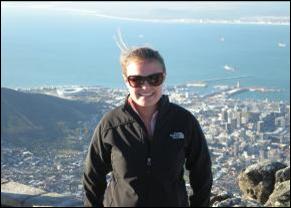
|
Former Princeton in Africa Fellows gathered together with Cordelia Persen, PiAf’s executive director at a watering hole in NYC on January 11, 2011.
PiAf is eager to hold more alumni events throughout the country. We need your help to plan them. If you are interested in organizing one, please get in touch with us.
|
|
January 15 marked the first six months of my time in Uganda and the halfway point of my internship with the International Rescue Committee (IRC). As the communications intern, it is my job to interview and photograph the beneficiaries of the IRC Uganda’s programs, which means I get to travel to our field sites across northern and northeastern Uganda every few months. I’ve had the chance to speak with formerly displaced people in Lamwo district, citrus and cassava farmers in Karamoja sub-region, and children in Kitgum about their experiences and how the IRC has supported them. I’ve also learned a lot about the country and the various sectors the IRC works in (health, education, peacebuilding, economic recovery and development, and gender based violence).
At the moment I am in the middle of a whirlwind tour of our three field sites—Karamoja, Lira, and Kitgum—gathering information for the IRC Uganda’s 2010 annual report, which I will be drafting and designing in the coming months. It’s a very interesting time to be in Uganda with the presidential elections coming up on February 18 and the regional and local elections to follow through March 7. It is widely expected that President Museveni will be reelected, but there has been some recent controversy over when the election results will be announced and whether the main opposition group will announce their own results independent of the national Electoral Commission (which would technically be illegal).
In many respects, Uganda has come a long way since the Government and the Lord’s Resistance Army signed a ceasefire in 2006. Only 1.8% of people displaced during the war in northern Uganda remain in displaced persons camps and the IRC’s work now tends more toward development and economic recovery than emergency humanitarian response. It also appears likely that by 2015 Uganda will achieve several of the Millennium Development Goals (MDGs), such as eradicating extreme poverty, promoting gender equality and empowerment of women, and combating HIV/AIDS, malaria and other diseases. Even so, there is a long way for the country to go. Uganda is ranked 143 out of 169 countries in the UNDP’s Human Development Index, and according to the World Health Organization, Uganda also has the highest per capita rate of alcohol consumption in all of sub-saharan Africa. In the Karamoja region of northeastern Uganda, the Karimojong people have been food insecure and dependent on the World Food Program and others for food distribution for the past 40 years as climate change and insecurity have made their traditional pastoralist way of life more difficult to maintain. One of the biggest problems in Uganda is corruption, which is perceived as rampant according to Transparency International. One of the best examples I’ve seen of the negative effects of corruption comes from conversations I’ve had with my coworkers about the elections. Many of them aren’t even registered to vote since they see the results as a foregone conclusion. While these elections seem to be determined already, there is hope that the opposition candidate will post strong enough results that next time there are elections the results won’t be a foregone conclusion. |
|
PiAf interviewed 110 candidates for 2011-12 fellowships. We were inspired by the enthusiasm and passion we discovered in our candidates and were greatly appreciative of the outstanding panel of interviewers made up of former and current Fellows, board members and PiAf staff. Now we will work our hardest to place the brightest and the best candidates! |
|
Fellow Tony Speare (LWF Burundi) stopped in to visit Fellow Helaina Stein (Generation Rwanda) on his East Africa holiday |
|
Tiffany King (Plan Uganda) and Becca Balis (IRC Liberia) met for lunch in Monrovia, Liberia in January at a nice airconditioned restaurant near the Royal Hotel in Monrovia |
|
Jamie Nadeau (Kucetekela Foundation, Zambia) visited Veda Sunassee at his fellowship post with the African Leadership Academy in Jo’burg, South Africa |
|
On January 24, the Princeton Club of New York hosted a panel and reception to discuss the topic of investing on the African continent and the challenges and opportunities that face investors. The panel was moderated by George Hritz, PiAf Board President and was attended by around 130 people. Other panel speakers included Teresa Clarke, CEO of Africa.com, Gustavo Eiben of Aureos Capital, Steven Fox P ’91 of Veracity Worldwide (and PiAf Foundation Board member), and Stuart Solsky CLS ’82 of Baker Botts L.L.P.
|
|
PiAf is excited to announce a new endeavor with Africa.com, the portal to everything about Africa. The website is featuring some of our Fellows’ blogs posts and so far they have posted blog posts by PiAf Fellows Katie Fackler (WFP Benin) and Allie Bream (WFP Ethiopia). We are excited to build our relationship moving forward. |
|
Twenty-one of our current Fellows have posted blogs about their experiences in Africa. If you would like to read more of our 2010-11 Fellows’ blog posts, please visit the “Fellows” page of our website. |
|
Panel: The Promise of Africa |
|
News from the PiAf Office: —Panel “The Great Recovery: the Promise of Africa” —Interviews for 2011-12 Fellowships |






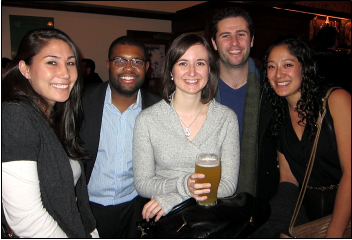
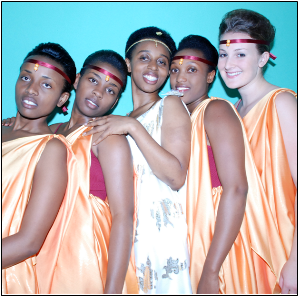
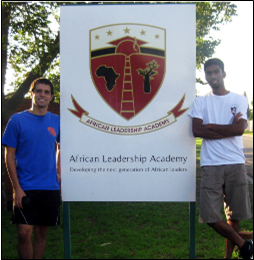
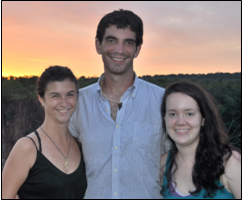
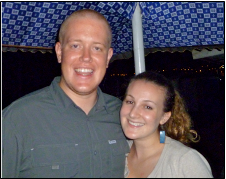
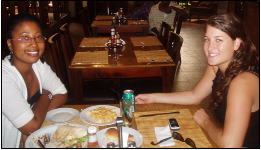
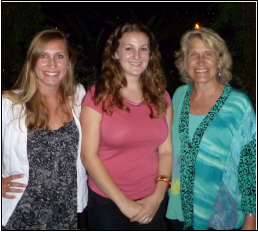
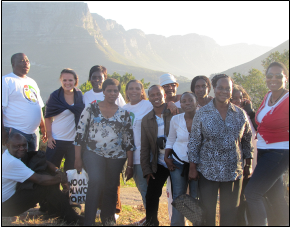
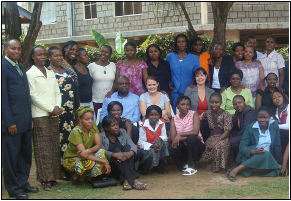
|
Hannah with with a new group of Mentor Mothers in Kerugoya, Kenya for a training in September |
|
Fellow Allie Gips (mothers2mothers, South Africa) and her mom, PiAf Board member Karen Harris, met Fellow Helaina Stein in Rwanda during their recent travels |

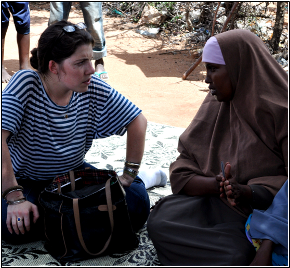
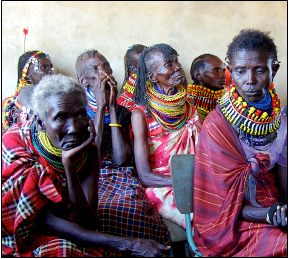
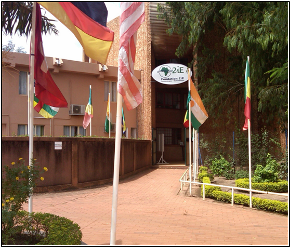
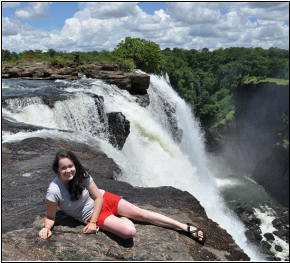
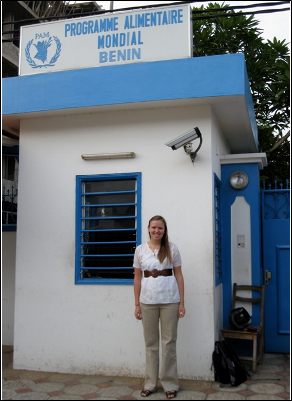
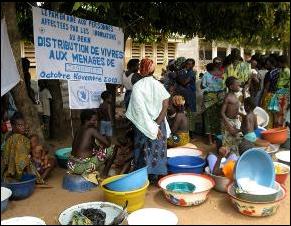
|
by Vicki Esquivel-Korsiak ‘10-’11 Fellow at International Rescue Committee, Uganda |
|
Notes From The Field |
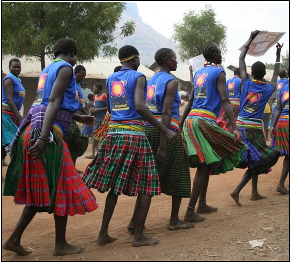
|
Sixteen Days of Activism Against Gender Violence campaign in Uganda |
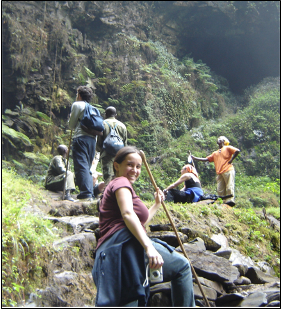
|
Vicki on a recent hiking trip before beginning her Princeton in Africa fellowship in Uganda |

|
PIAF INTERVIEWS 2011 |

|
AFRICA.COM FEATURES PIAF FELLOWS’ BLOGS |
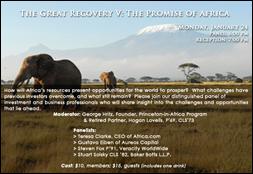
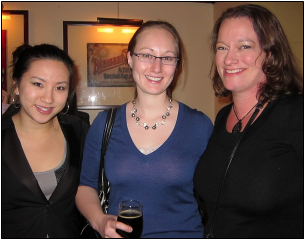
|
Pictured here are Lindsey Stevens ‘07-’08 Bristol-Myers Squibb Fellow at Harvard AIDS Institute, Botswana; Ettie Philitas ‘09-’10 Fellow at African Leadership Academy, South Africa; Alyson Zureick ‘07-’08 Fellow at IRC Sierra Leone; Adam Herling ‘07-’08 Fellow at One Acre Fund, Kenya and Lindsey Locks ‘07-’08 Fellow at World Food Program, Uganda.
|
|
Yuting Lien 06-07 PiAf Fellow at African Leadership Academy in South Africa, Marilyn Michelow 07-08 PiAf Fellow at World Food Program Namibia and Cordelia Persen, PiAf Executive Director |